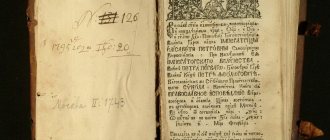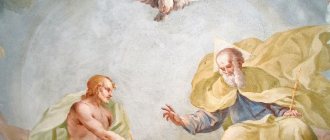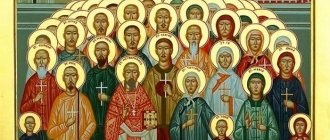The word “blessed” was used to mean the state in which a person is. The meaning of the term differs in the Western and Eastern churches - in Catholicism, “blessed” people are called blessed after death. In the Russian Orthodox Church, individual saints and holy fools are called this way. This word came to us from Old Church Slavonic and meant people bearing the cross of foolishness.
What does blessed mean
The word “blessed” is translated from Greek and Latin as “happy.” Blessed are people who are able not only to see God, but also to communicate with him, who bring his word and will into the world.
In Christianity, they include a special group of saints. The term comes from the Old Slavonic word “bologo”, which should be understood as “to make good, good.”
Church interpretation
In Rus', this word was used in the meaning of “holy fool”. These included people who deliberately seemed stupid for their simplicity and naturalness; wandering the earth, deliberately depriving themselves of benefits and housing. In Orthodoxy, holy fools were wandering monks and other people who helped others free of charge and had the gift of foresight and healing.
Bishop of Hippo Saint Augustine and Saint Jerome of Stridon are the most revered and glorified blessed people in Orthodoxy.
In the Catholic Church, this word was used to describe ascetics, that is, those who deliberately exposed themselves to various deprivations - ascetics. They were called righteous because they lived the way a person should live according to the canons of the Bible.
Origin of the word
The Slavs used the word “blazhiti” - “to praise.” One of the surviving meanings of the word “blessed” is the state of a person in which he is happy, peaceful and calm.
Another “whim” can be understood as stupidity, irregularity, non-standard behavior, thoughtless stubbornness.
The word “blessed” means “bad”, “crazy”.
“Bliss” in modern Russian has the meaning of “satisfaction.”
The concept of “blessed” is “to be extremely happy”
The semantics of the expression differs in Orthodoxy and Catholicism, but a common meaning is identified. “Blessed” are called righteous people who do not succumb to the temptation of earthly goods, who behave “abnormally”, insanely for ordinary people.
The word comes from "blessing"«,
What does it mean to “respect, praise.” During its existence, the word has undergone semantic changes, and in modern language one of the meanings of the word is “saint”, the other is “eccentric, stupid”. This is due to the fact that previously in Rus', revered holy persons were often holy fools. In the Eastern Church, holy fools were treated with reverence.
Foolishness is a tradition since the times of the biblical Old Testament
The Old Testament prophet Isaiah walked barefoot and did not cover his nakedness for 3 years. With his defiant, from the point of view of ordinary people, behavior, Isaiah sought to draw attention to the words about the impending Egyptian captivity for the people. Another prophet, Ezekiel, ate bread cooked in cow dung, which was a call to repentance.
Each of the prophets was blessed, as their contemporaries testified. It is interesting that the Old Testament prophets only at times behaved like holy fools; perhaps they were not yet ready for that asceticism, which the Apostle Paul later spoke of as foolishness for the sake of Christ.
Who are called blessed?
Who is a blessed person, you can see many definitions in dictionaries.
Thus, in Ozhegov’s explanatory dictionary the word “blessed” means:
- blessed, supremely happy;
- not a completely normal person, a synonym for the word “holy fool”;
- saint.
In the explanatory dictionary of Dmitriev D.V. term means:
- a person behaving strangely, eccentrically;
- time, a state in which a person experiences a feeling of happiness and complete peace;
- a deeply religious person who, for religious reasons, left his family, property and wandered around the world in the name of Christ;
- a person with the gift of foresight.
In the modern world, it is customary to call people who are simple-minded, somewhat naive, stupid, and outside the box, blessed.
Attitude towards the blessed
The entire Christian world treats the blessed with special reverence for their service to the Lord and the truth.
From the Gospel of Matthew:
“Blessed are the poor in spirit, for theirs is the kingdom of heaven.”
Lines like these become the main basis for Christians when they decide on solitude, hermitage, and renounce earthly goods to save their souls.
The blessed do not have goods, including property, and live poorly for the sake of the Lord. The blessed ones did not live like everyone else, and therefore in some places they were disliked and feared.
The feat of holy fools is that they remind everyone else about the sacrificial love of the Teacher, the need for heartfelt participation, and not external adherence to rituals and generally accepted norms.
Because of their “otherness” and originality, society was always afraid of them and shunned them. Because foolishness is comparable to “abnormality.” But, nevertheless, the holy fools were treated with respect, because they knew that not everyone would dare to become like this and bring the word and work of God to people.
Foolishness in Rus' was called a feat - to become such, you had to abandon your family, all your benefits, live homeless, on alms alone. The feat of foolishness assumed that a person pretends to be a fool in order to tell people the truth and expose evil.
Ksenia Petersburgskaya
Photo: Sofrino.ru
A great misfortune helped Ksenia Grigorievna Petrova become one of the most beloved saints in Rus' - when she was only 26 years old, her beloved husband died. And Ksenia emerged from her carefree life, wealthy in high society, put on her husband’s suit and began to tell everyone that Ksenia had died, and her husband Andrei Fedorovich, here he was, was alive.
She gave away her property to the poor, gave her house to a relative, and kept all her papers as if she were of perfect sound mind. And throughout his life, performing a feat of madness for the sake of Christ, he helped those in trouble. At the same time, she herself had neither things nor a roof over her head. And the Lord rewarded her with the gift of foresight and insight into the souls of people. He saved people from troubles and misfortunes many times.
Recommended reading: Prayers of Xenia of St. Petersburg
Famous Blesseds
In the Russian Church, the blessed are identified as a separate group of saints.
St. Basil the Blessed
Among the most respected and revered blessed ones is St. Basil, who was called Naked. The saint was born in the village of Elohovo not far from Moscow. The years of the saint’s life vary: according to some, he was born either in 1462 or 1469, but it is known for certain that he died in 1557. St. Basil was called the Moscow holy fool. He was canonized in 1588. His relics were taken to the Intercession Cathedral, popularly called the name of St. Basil's Cathedral. The saint could foresee the future, and people attribute miraculous qualities to his relics.
He was born into a poor family of ordinary peasants, who decided to give him to a master shoemaker. While studying with a craftsman, Vasily showed himself to be a hardworking young man, but he did not strive to become a master, since even in his youth he felt a different purpose for his life’s path.
The gift of foresight was discovered by chance. This happened when a certain man came to his master and asked him to sew boots that would last him a long time. The apprentice Vasily, having heard such words, smiled, and then told his master that this man would not need boots, because he would die tomorrow. And this really happened.
At the age of sixteen, he stopped studying the craft, choosing the feat of foolishness. Naked did not wear clothes and did not have his own home, he experienced great hardships. A heavy cross hung on his chest, chained to his body with powerful chains. The life describes how the holy fool taught people the right life by word and example.
During his lifetime, St. Basil performed many miracles:
- One day, thieves discovered an expensive fur coat on the holy fool, donated by a certain nobleman. They decided to take away the holy fool’s clothes. One of the thieves pretended to be dead, and the rest began to ask Vasily for the funeral. Vasily first covered the dead man with a fur coat, but then realized that he was being misled and said: “The fox’s fur coat covers the fox’s cunning deed.
Now be you dead for wickedness, for it is written: Let wickedness be consumed . After he left, his accomplices rushed to their comrade, but he turned out to be dead. - One day the holy fool scattered rolls of bread at the market. After this, the seller admitted that for the sake of greater profit he mixed lime and chalk into the flour.
- The “Book of Degrees” described the case of how in the summer of 1547 the holy fool came to Ostrog to the Ascension Monastery and prayed for a very long time with tears in front of the church. The very next day, the Moscow fire began in the capital, going down in history as the most devastating. The fire began to spread from this monastery.
- Once, while in Moscow at the feast of Ivan the Terrible, Vasily poured three goblets of wine out the window. The enraged king demanded that the holy fool explain the reason for such an absurd act. Vasily replied that he stopped the fire in Novgorod with wine. A couple of days later, messengers brought news to the capital that a terrible fire had broken out in Novgorod, and an unknown naked man helped put it out.
- One day, incomprehensible and brutal behavior occurred - Vasily angrily smashed the image of the Mother of God on the Varvarinsky Gate, which had been considered miraculous by the people for many decades. People from all over the country came to this image, asked the Mother of God for healing and prayed to her. The pilgrims attacked the elder and began to beat him. Vasily told them to scrape the layer of paint on the image. Having removed the paint layer, the pilgrims saw a hidden image of evil spirits under the image of the Mother of God.
- A certain merchant was building a stone church. However, construction did not work out - the vaults collapsed three times. The philanthropist turned to the saint for advice, and he sent poor John to find him in Kyiv, saying that he would help complete the construction of the church. The merchant found John. He was sitting in a dilapidated house and rocking an empty cradle. The merchant asked who he was pumping. John replied that he was rocking his own mother, because she gave him life and raised him. At that moment, the merchant realized the mistake he had made and he felt very ashamed of his action. And all because he kicked out his mother and did not keep in touch with her. The merchant found his mother and brought her home. And then he completed the church, because he had atoned for his guilt.
Even Tsar Ivan the Terrible was afraid of Basil the Blessed and, when he became seriously ill, visited his deathbed.
Vasily died in 1557. Ivan the Terrible and the boyars carried his body. Vasily was buried in the Trinity Church cemetery. There, the tsar gave instructions to build the Intercession Cathedral. Now the cathedral is known as St. Basil's Cathedral.
Ksenia Petersburgskaya
During the period when the country was led by Queen Elizabeth, a holy fool, Ksenia Grigorievna, lived in St. Petersburg. She was widowed while still very young. Afterwards, the woman distributed all her belongings to those in need, put on her husband’s clothes and set off to wander.
Ksenia, in any weather, went into the field at night and stood on her knees, reading prayers all night.
She tried to help the poor, disadvantaged and sick people, but did not advertise her identity and hid her actions from people. At that time, a stone temple was being built in Smolensk. One day, builders noticed that someone at night, when no one was there, was dragging bricks to the very top of the church under construction. It turned out that Ksenia did this under cover of darkness.
The townspeople loved the holy fool and considered it lucky if she came to visit them. And she was also revered by cab drivers, they even had their own sign - if they managed to give her a ride, then there would definitely be success in business.
During her lifetime, Ksenia of Petersburg performed many miracles:
- She had the gift of foresight, but she did not specifically predict anything, and if this happened, it was sure to come true.
- They said that the saint helped her childless friend Paraskeva, directing her to go to the Smolensk cemetery, where she would find the joy of motherhood. At the cemetery, Paraskeva saw that something bad had happened - a pregnant woman was run over by a cart and she gave birth, and then died. The child was born strong and healthy, and Paraskeva became his mother.
- She helped a young girl get married by sending her to the cemetery, because her husband was burying his wife there. There the young girl saw a widower, whom she later married.
- Before the death of Empress Elizabeth, the holy fool walked around the city and loudly said that pancakes needed to be baked. Pancakes were baked not only for Maslenitsa, but also for funerals.
- There were cases when the saint helped to cope with the fire. At the place where the fire was raging, she extinguished it with her prayers. One day on the street Ksenia saw a stranger and handed her a coin, saying that a nickel would help put out the fire. The puzzled woman hurried home and, approaching her street, saw that her house was on fire. The woman ran towards the house, clutching a nickel in her hand, and when she ran up to the house, the fire went out.
Ksenia lived to an old age and was buried at the Smolensk cemetery in St. Petersburg. A small chapel was built on her grave, which is a revered shrine in St. Petersburg. At the saint’s burial place, pilgrims receive healings, and prayers help bring peace to families.
Why is Saint Xenia considered the heavenly intercessor of St. Petersburg?
“I once saw a real holy fool. It was a long time ago, half a century ago. He was a wandering man, a layman, not a priest, he walked throughout the entire land of the Soviet Union with such a large staff that it resembled a cross. Outwardly he seemed a little abnormal, but he only seemed so. It was enough to talk to him to understand that this is not so, that he is a wise man, but who abandoned all the blessings of this world in order to carry the message of Christ in the way that was possible at that time. This, after all, is intercession - when a person gives all of himself so that God can be present in the lives of other people. I don’t know his fate, but I remember his image, and it still stands before my eyes,” says Georgy Kochetkov.
“True heavenly intercession, if we understand it churchly, is also connected with the special presence of God, which we feel in life through holy people. This is not some external force that somehow protects us from adversity and difficulties, says Georgy Kochetkov. – Every city is famous, one might even say, boasts of its saints, because this is real wealth. So in Moscow, St. Basil and other holy fools are especially dear to us, because they have this prophetic element, this extreme, even transcendental freedom of spirit, which does not submit to any oppression, any despotism of kings, Caesars, emperors.”











